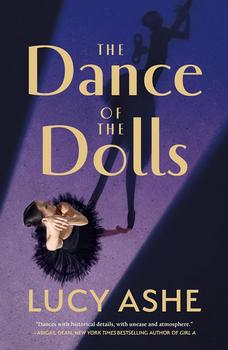Summary | Excerpt | Reading Guide | Reviews | Beyond the Book | Readalikes | Genres & Themes | Author Bio

The stone well cover, found by builders nearly three hundred years ago, has been preserved, protected from destruction every time the theatre is pulled down and built again, emerging from the ashes with new ideas for new entertainments. Even the builders, it seems, were superstitious. Our theatre isn't perfect. But I still love it, despite the tiny dressing rooms and the terrible acoustics in the auditorium.
It seems darker than usual this morning, shadows dancing slowly between the steel beams and the low, still water of the well. I can barely see to the end of the room where a storage cupboard is hidden in the corner and a wooden crate of stage props gathers dust. I looked inside the cupboard once, only to be confronted with mops and ropes, as well as a strange display of tennis balls and cricket bats. The theatre is gradually filling with the debris of productions, each show leaving behind its mark. A stack of photo graphs that didn't quite make the walls of the theatre foyer is leaning against the back wall, frozen moments of Les Sylphides, Narcisse et Echo, Les Rendezvous, Nursery Suite, the monochromatic figures blurred and faded. It is wonderful to be part of Ninette de Valois's growing company, the ballets we put on works of art to rival even the legendary days of the Ballets Russes. I do not miss those long nights that Clara and I have spent shivering in cold dressing rooms waiting for our performance in variety shows and revues, squashed between singers, comedians, even Cochran's pretty young ladies who gave us no space in the mirror to do our makeup. Our little ballet numbers were divertissements, instantly forgotten. But not anymore, not with our Ninette de Valois and Lilian Baylis and the Camargo Society propelling us forward.
With cold and frigid air, this is not a place to linger before class. Coming here alone, without the sweat and heat of the other dancers' bodies to fill the space, the room smells damp, like laundry that has been left wet too long. But I have wishing to do this morning. I need some luck. Nicholas Sergeyev is coming to class today.
His arrival has sent whispers around the theatre corridors for weeks, and I am sure the cafés of Bloomsbury and Covent Garden are spreading our excitement even further. Regisseur of the Mariinsky Ballet, Nicholas Sergeyev escaped in the aftermath of the 1917 October Revolution. Somehow, among all the panic, he smuggled out tin trunks holding all his notation books. The records of the great Russian ballets were preserved.
And now he is coming to us. He is to teach us the ballets that made Russian dance so famous. There is to be Coppélia, Lac des Cygnes, Giselle and even Casse-Noisette. I have heard so much about these ballets. I long to learn the choreography, to lift the notations off the pages of those old books and transform them into living dance. It would be wonderful to see the notebooks, to see the steps Petipa and Ivanov marked onto the page using that devilishly difficult Stepanov notation. There is no way I could understand a single symbol, but I will learn the steps faster and more accurately than anyone. Even my sister, I think. Clara is not very good at sticking to the choreography. It drives Miss Moreton mad. Me too, to be honest. It is one of the reasons I always wear my hair in a low bun, in the romantic style. It sets me apart from Clara, who always wears her hair high: one small difference to help people see us as two distinct dancers.
I perch on the stone edging and lean over into the well, dipping my hand into the water. I have to stretch as far as my arm will go, my fingers just breaking the surface. My knees press against the wall of the well, but the distance is too far and I slip, my ribs hitting hard against the stone. Then I find my balance again, blinking as I watch the water moving and rippling like a kaleidoscope of grays and blacks, hiding whatever lurks beneath the surface. I lift my arm out, my fingers wet, and let the little drops of water fall onto my pointe shoes. The sharp pain of the stone against my ribs has startled me awake, reminding me of what I need to do today. Without pain, how do we know we are working hard enough? I said that to Clara once and she laughed at me. She didn't understand what I meant.
Excerpted from The Dance of the Dolls by Lucy Ashe. Copyright © 2023 by Lucy Ashe. Excerpted by permission of Union Square & Co. All rights reserved. No part of this excerpt may be reproduced or reprinted without permission in writing from the publisher.




There are two kinds of people in the world: those who divide the world into two kinds of people, and those who don'...
Click Here to find out who said this, as well as discovering other famous literary quotes!
Your guide toexceptional books
BookBrowse seeks out and recommends the best in contemporary fiction and nonfiction—books that not only engage and entertain but also deepen our understanding of ourselves and the world around us.